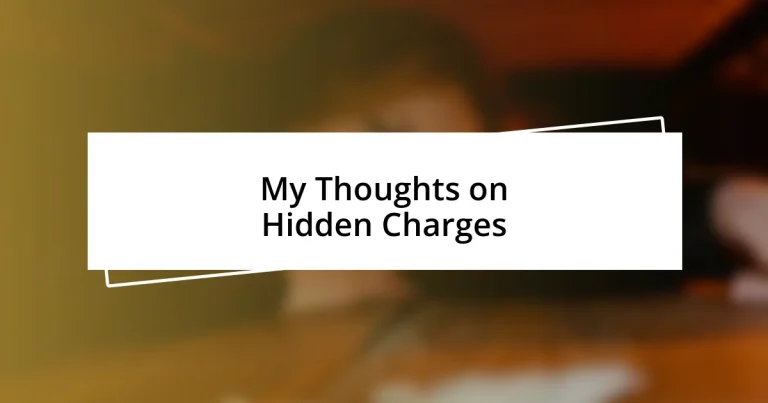Key takeaways:
- Hidden charges often lurk in fine print, leading to unexpected costs and feelings of betrayal; consumers should read reviews and ask questions to avoid surprises.
- Common hidden charges include service fees, cancellation fees, resort fees, delivery charges, and currency conversion fees, which can distort the perceived value of products and services.
- Transparency from businesses is vital for building consumer trust and loyalty; clear communication about pricing helps consumers make informed decisions and fosters repeat business.
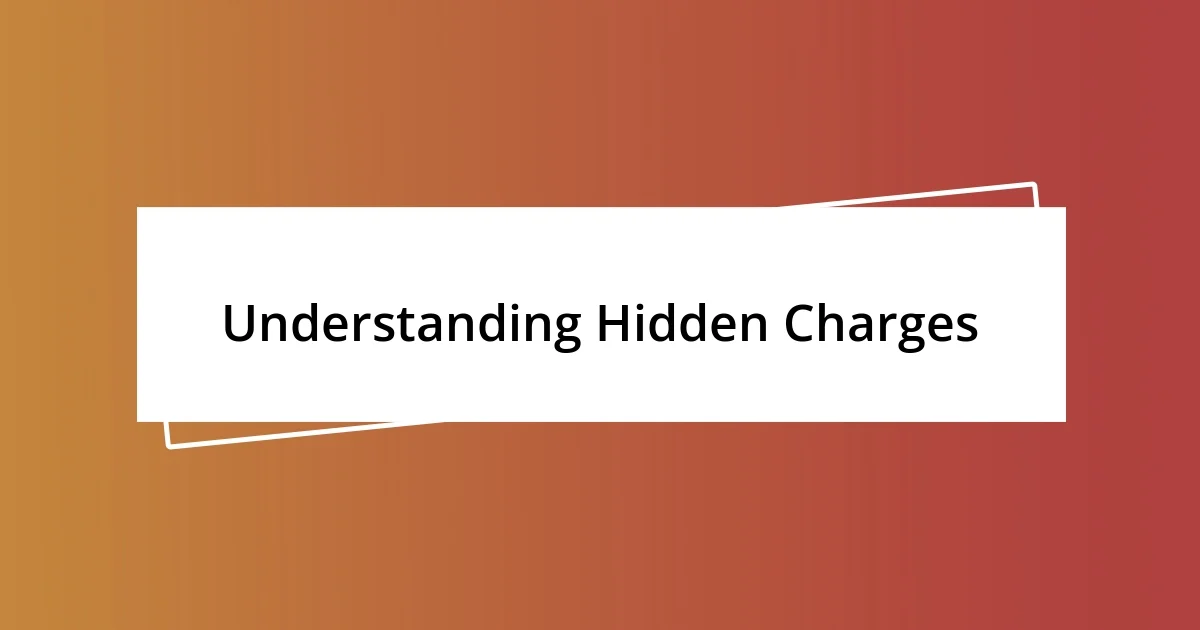
Understanding Hidden Charges
Hidden charges can sometimes feel like a stealthy betrayal, sneaking up on you when you least expect it. I remember booking a hotel once, enticed by a low rate online, only to discover countless extra fees when I arrived. Have you ever experienced that moment of disbelief when the final bill arrives? It’s frustrating and can leave you feeling duped.
Understanding hidden charges is crucial in avoiding those unpleasant surprises. Often, companies bury these fees in fine print or use confusing terminology that makes it difficult to spot them. Reflecting on my own experiences, I find it’s essential to read reviews or ask questions upfront. How many times have you wished you’d done a little more digging before committing?
Additionally, hidden charges can stem from various corners—service fees, administrative costs, or unexpected taxes. These can transform a seemingly reasonable purchase into a much larger expenditure. I’ve learned to always do a final tally of potential costs before making decisions. What about you? Have you taken that extra step to ensure you’re fully informed?
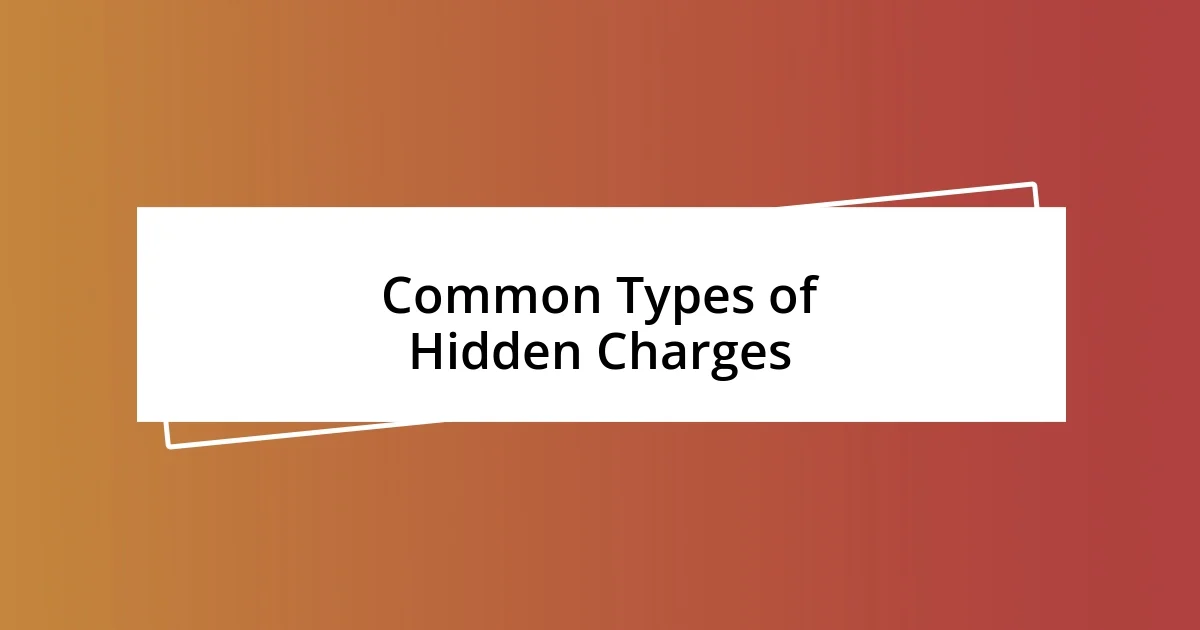
Common Types of Hidden Charges
When it comes to hidden charges, there are a few common culprits that I’ve encountered time and again. I remember signing up for a gym membership, lured in by a promotional rate, only to find out about an initiation fee that wasn’t highlighted during the sign-up process. It’s these sneaky add-ons that can really catch you off guard.
Here are some common types of hidden charges you might face:
- Service Fees: Frequently attached to bookings or subscriptions without clear notification.
- Cancellation Fees: Often hidden in the fine print and can vary widely based on timing.
- Resort Fees: These are particularly prevalent in hotel bookings, adding extra costs for services you may not even use.
- Delivery Charges: Some online retailers pile on these unexpected costs at checkout.
- Currency Conversion Fees: If you’re traveling, watch out for these when using your credit card abroad.
It’s a real eye-opener, isn’t it? Checking for these charges before finalizing a deal can save you from the disappointment I experienced during my gym ordeal.
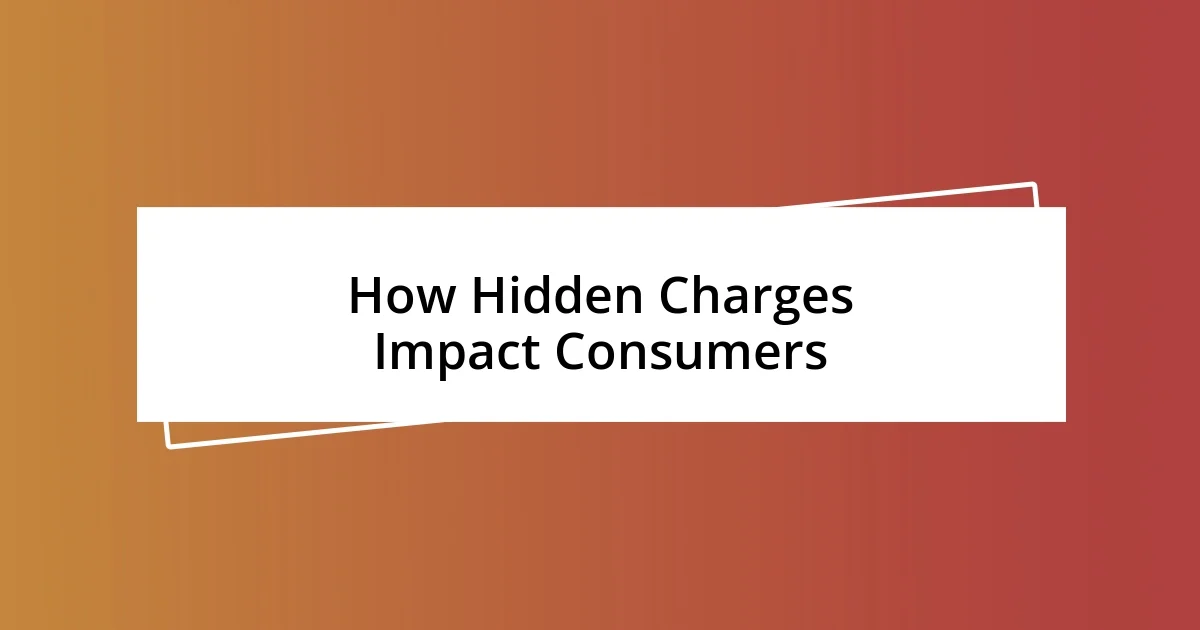
How Hidden Charges Impact Consumers
Hidden charges have a profound impact on consumers, often leaving them feeling exploited and frustrated. I remember a time when I ordered something online, only to find that shipping and handling fees were more than the item itself. It made me rethink my purchasing decisions and question the transparency of online retailers. Have you felt that sinking feeling when the final cost isn’t what you expected?
The emotional toll that hidden charges take shouldn’t be overlooked. When I had to pay extra fees for an event ticket that wasn’t disclosed initially, I felt like my excitement had been robbed, leaving me disappointed and a bit angry. Consumers crave clarity, and when we come across unexpected charges, it can lead to a distrust of the brand as a whole, affecting loyalty and future purchases. Have you ever sworn off a business because of those hidden fees?
It’s fascinating how hidden charges can distort the perceived value of a product or service. Once, I hesitated to sign a lease for an apartment after discovering additional costs for utilities that weren’t clearly communicated. An attractive deal can quickly evaporate when hidden fees come into play. Consumers need to become vigilant advocates for their financial well-being, always asking questions and seeking full clarity to avoid unpleasant surprises in their financial planning.
| Impact of Hidden Charges | Emotional Reactions |
|---|---|
| Financial Burden | Frustration |
| Distrust in Brands | Feeling Duped |
| Overlooked Costs | Disappointment |
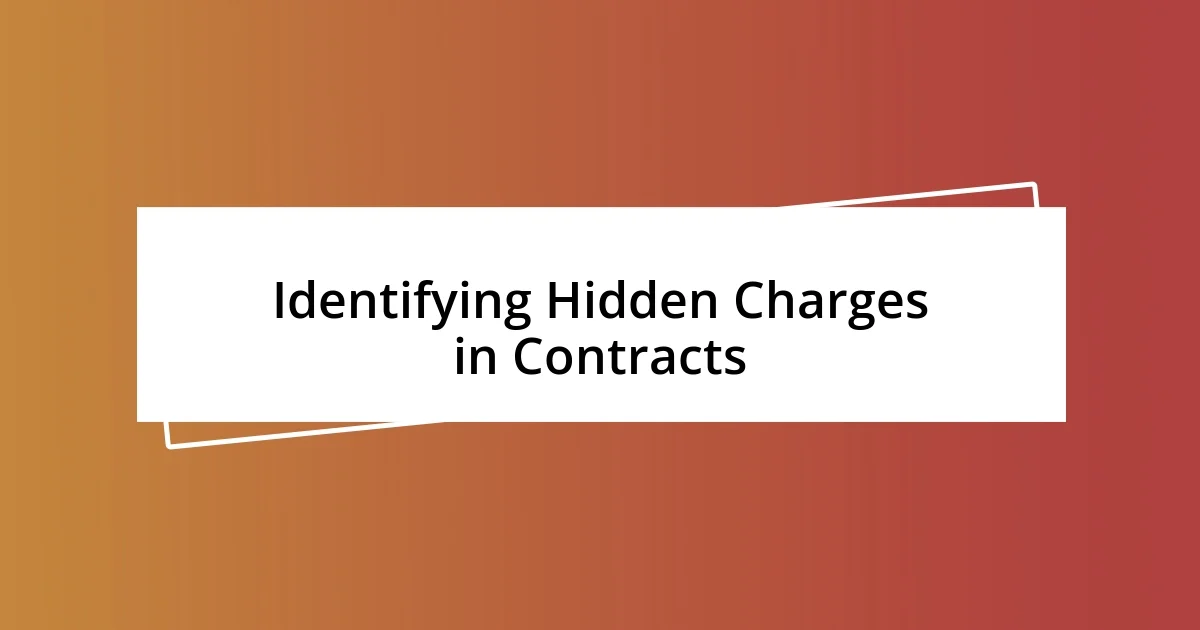
Identifying Hidden Charges in Contracts
When I’m reviewing contracts, I’ve learned to look for vague language that might suggest hidden charges. Just recently, I signed a service agreement and noticed some terms that felt ambiguous. It made me think, “What exactly is included in this price?” Without clear definitions, it’s easy for companies to sneak in extra charges.
One of the most striking moments for me was when I took a closer look at a rental agreement. I almost overlooked a section about “administrative fees” that seemed harmless at first. Yet, this small line ended up costing me more than anticipated. It’s a reminder for all of us to read the fine print carefully; sometimes those tiny clauses contain big surprises.
Have you ever highlighted terms in a contract that seemed straightforward but turned out to be deceptive? I recall spotting an additional “processing fee” buried within a lengthy warranty document. It felt like a personal betrayal, like being drawn in by a shiny advertisement only to find the truth hidden away. Engaging in this level of scrutiny not only protects your finances but reinforces a culture of transparency we all deserve.
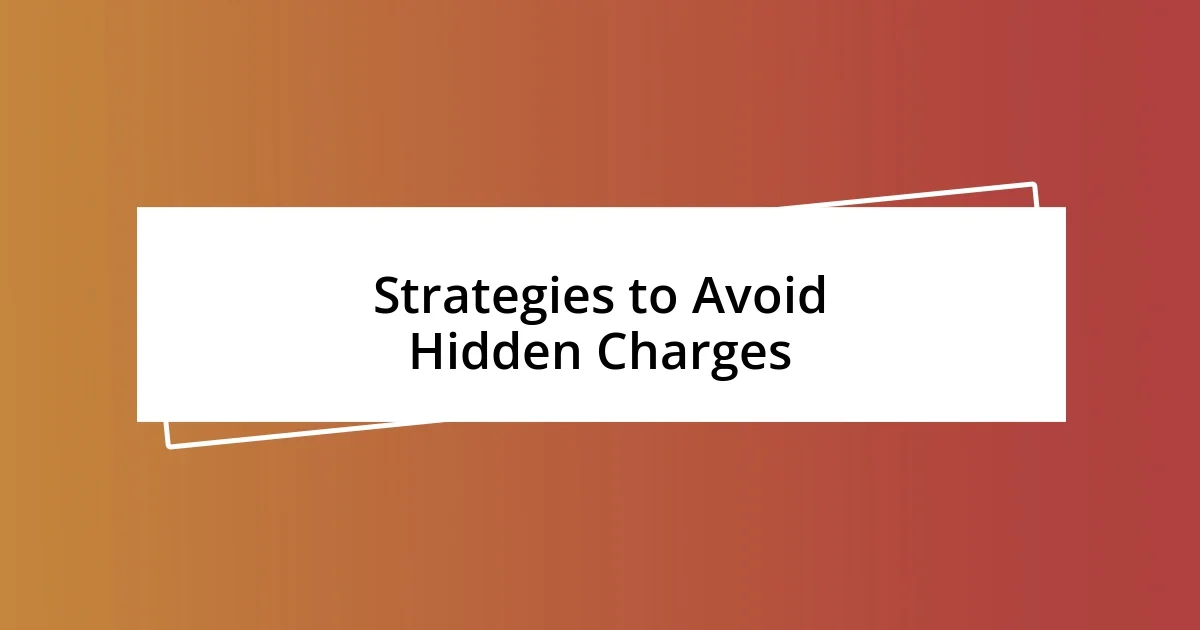
Strategies to Avoid Hidden Charges
One effective strategy to avoid hidden charges is to ask direct questions before committing to any purchase or service. I remember asking a hotel staff member specifically about their resort fees. Surprisingly, they provided a detailed breakdown, which ultimately made me feel more comfortable about my choice. Have you ever taken a moment to ask those crucial questions before finalizing a purchase? It can be a game changer.
I also find it helpful to do some online research into potential hidden fees associated with a product or service. For instance, when I was considering a new phone plan, a quick search revealed that certain carriers had extra charges for data overages or activation fees. Knowing this upfront allowed me to make a more informed decision and avoid unpleasant surprises later. Isn’t it amazing how a little preparation can lead to significant savings?
Lastly, I advocate for leveraging technology to stay informed. There are apps out there designed to scan your bills for hidden charges. I recently started using one, and it flagged a subscription fee I had forgotten about, saving me money. How often do we overlook these ongoing charges? Being proactive not only enhances awareness but can contribute to better financial health in the long run.
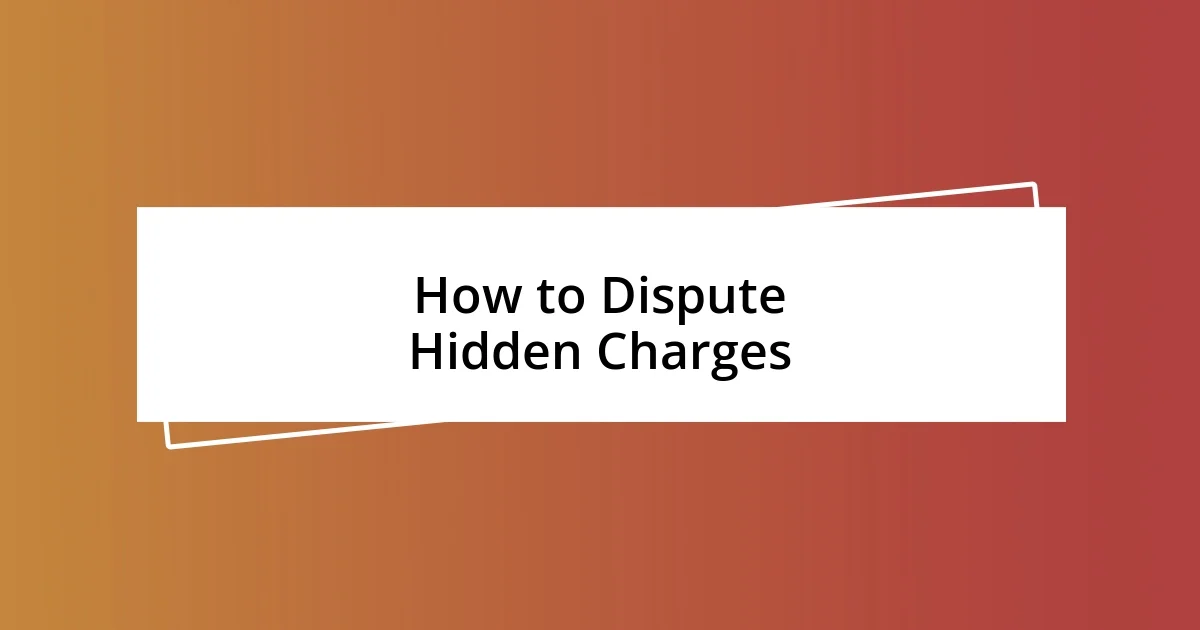
How to Dispute Hidden Charges
Disputing hidden charges can feel daunting, but it’s essential to approach it with a clear strategy. After I discovered an unexpected fee on my phone bill, I immediately called customer service. I expressed my concerns calmly and clearly. To my surprise, they not only reversed the charge but also offered a credit for my next bill. Have you ever considered how just a polite request can sometimes work wonders?
Documentation is crucial when disputing hidden charges. I learned this firsthand after encountering a surprise fee on my internet service. I had kept records of my previous bills, highlighting the promised prices, which made it easier to argue my case. When I presented this information, it shifted the conversation. Don’t you think being prepared can empower you in negotiations?
If your initial attempt at resolving a hidden charge doesn’t yield results, don’t hesitate to escalate the situation. I recall feeling frustrated after a customer service rep wouldn’t budge on a charge I believed was unjust. I asked to speak to a supervisor, and it soon became apparent that my persistence paid off. Sometimes, it takes a firm but respectful approach to get the resolution you seek. Have you ever felt that sense of relief when your persistence finally leads to success?
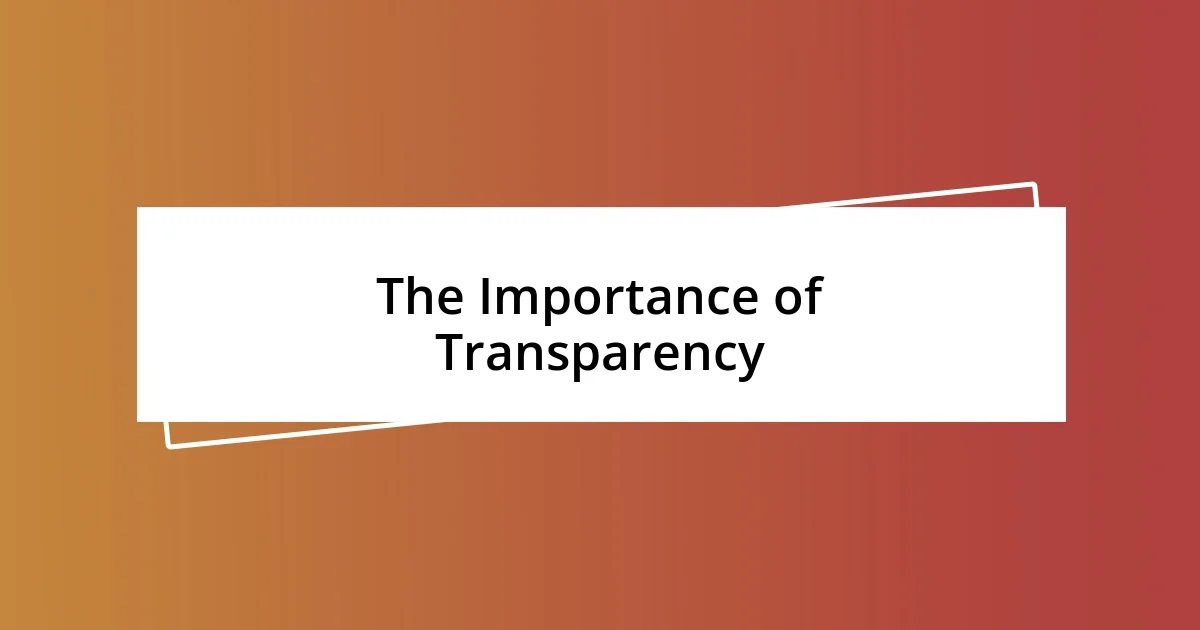
The Importance of Transparency
Transparency is crucial in building trust between consumers and businesses. I remember vividly the feeling of frustration when I was hit with unexpected charges during a vacation. Had I been informed upfront, that experience would have been much smoother. It makes me wonder, don’t we all deserve to know exactly what we’re paying for?
I believe that when companies are transparent about their pricing, it not only fosters goodwill but also encourages repeat business. I once chose a local restaurant simply because they clearly listed all prices, including taxes and tips. I left feeling valued and appreciated; transparency can make all the difference in customer loyalty. Isn’t it refreshing to know what to expect?
Moreover, transparency empowers consumers to make informed decisions. After learning about a friend’s experience with hidden charges from a subscription service, I felt relieved I had opted for a competitor with clear pricing. I think it’s essential for businesses to understand that a little honesty can turn a one-time customer into a long-term advocate. How can we advocate for more transparency in our daily purchases?












